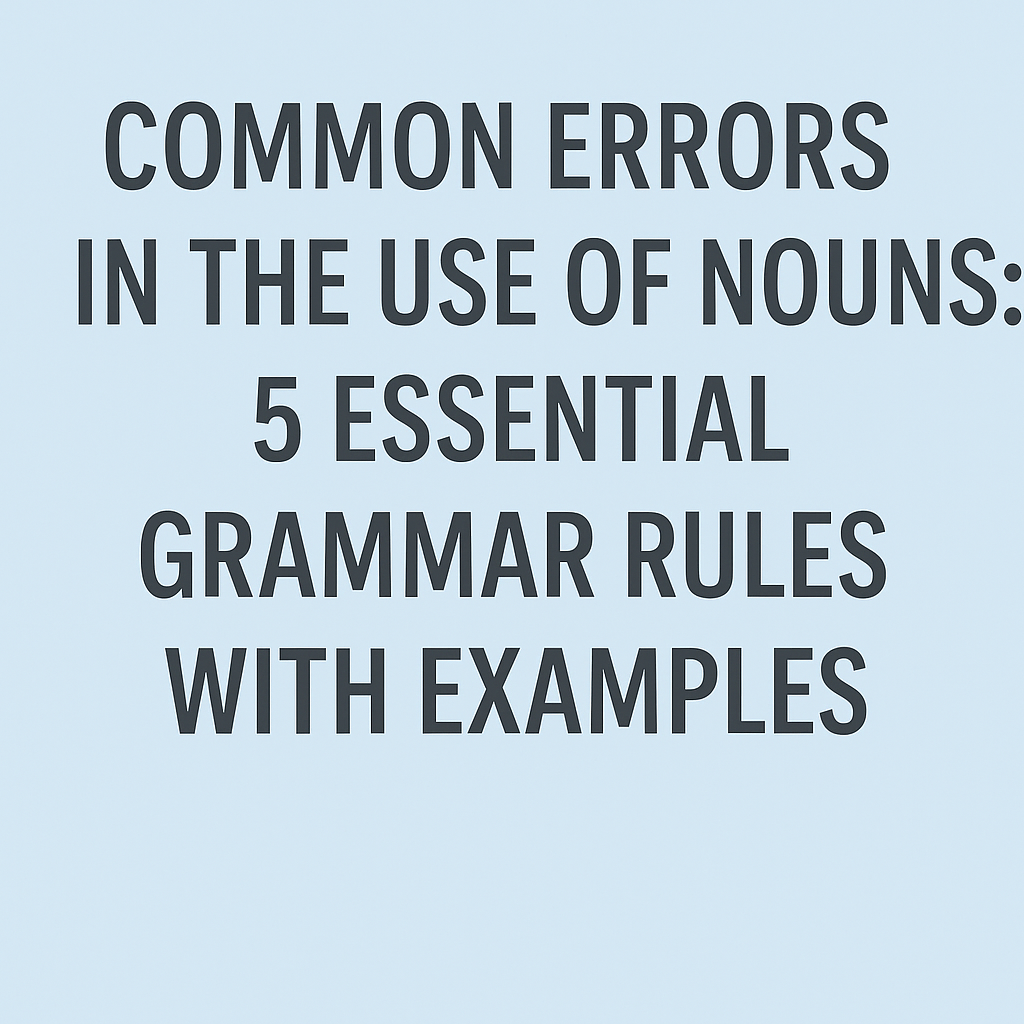Errors in the Use of Nouns-Grammar Puzzle Solved-(49)
Errors in the Use of Nouns
Correct noun usage is fundamental to writing and speaking English accurately. Yet, many learners fall into common traps when using nouns in sentences. These mistakes can cause confusion, weaken writing, or make speech sound awkward. In this article, we identify five key rules that help avoid frequent errors in the use of nouns, along with practical examples to clarify each rule.
Rule 1: Countable vs Uncountable Nouns Must Match Their Usage
One of the most common mistakes is confusing countable and uncountable nouns. Countable nouns can be pluralized (books, chairs), while uncountable nouns cannot (milk, advice).
Incorrect:
She gave me many advices.
Correct:
She gave me much advice.
Tip: Never add “s” to uncountable nouns like information, furniture, luggage, or news.
Rule 2: Do Not Use Articles with Proper Nouns
Proper nouns refer to specific people, places, or things and do not take an article like “the” in most cases.
Incorrect:
The Shakespeare wrote many plays.
Correct:
Shakespeare wrote many plays.
Note: However, some proper nouns require “the” when referring to things like rivers (the Nile), mountains ranges (the Himalayas), or countries with plural names (the United States).
Rule 3: Use Singular or Plural Form Appropriately
Some nouns appear plural but are actually singular, while others look singular but are plural. Misjudging the form can lead to verb agreement errors.
Examples:
- Incorrect: The news are shocking.
- Correct: The news is shocking. (News is singular)
- Incorrect: Physics are my favorite subject.
- Correct: Physics is my favorite subject. (Physics is treated as singular)
Common Singular-Form Plural-Sounding Nouns:
News, mathematics, politics, economics
Common Plural-Form Nouns Without Singular:
Clothes, scissors, trousers, binoculars
Correct Example:
These scissors are sharp. (Use plural verb “are” with plural-only noun)
Rule 4: Do Not Mix Up Irregular Plural Forms
English has many irregular plurals that do not follow the typical “add -s” pattern. Learners often make mistakes by regularizing these irregular forms.
Incorrect:
She has two childs.
Correct:
She has two children.
Incorrect:
The womans are waiting.
Correct:
The women are waiting.
Quick List of Irregular Plurals:
- Man → Men
- Woman → Women
- Child → Children
- Tooth → Teeth
- Foot → Feet
- Mouse → Mice
- Person → People
Always memorize these forms, as adding “s” is not acceptable.
Rule 5: Avoid Redundant Plurals with Collective Nouns
Collective nouns refer to a group of individuals but are treated as singular or plural based on context. The error occurs when learners add both plural form and refer to individuals redundantly.
Incorrect:
The police is arriving.
Correct:
The police are arriving.
“Police” is a plural noun—never use “polices.”
More Examples:
- Incorrect: The cattle is grazing.
- Correct: The cattle are grazing.
- Incorrect: The staff is giving their reports.
- Correct: The staff are giving their reports.
(if referring to staff as individual members)
Note: Collective nouns may be singular in American English but plural in British English depending on context.
Final Thoughts
Avoiding errors in the use of nouns improves clarity and professionalism in writing. Whether it’s mastering uncountable nouns, choosing the correct plural form, or handling collective nouns properly, these five rules form a strong foundation. Always double-check noun types before applying verbs or modifiers, and remember that English noun rules often come with exceptions—so examples and practice are key.
For more puzzles and grammar tips, keep following Grammar Puzzle Solved. Understanding these rules doesn’t just fix errors—it builds confidence and fluency.

Good VS Well: https://grammarpuzzlesolved.englishlitnotes.com/good-vs-well-grammar-rule/
The Parliament of Fowls Summary: https://englishlitnotes.com/2025/05/13/parliament-of-fowls-summary/
For grammar lessons, visit ChatGPT to explore the platform and interact with the AI: https://chat.openai.com
Discover more from Grammar Puzzle Solved by Naeem Ullah Butt
Subscribe to get the latest posts sent to your email.